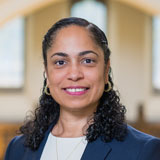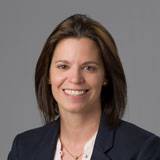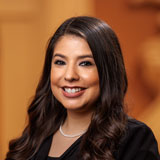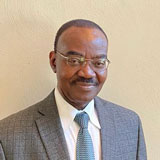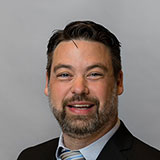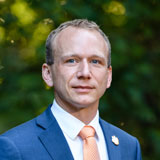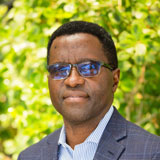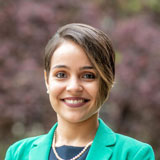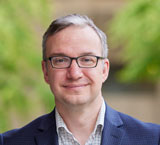Voting Closed Friday, March 1
The 2023-2024 Nominations & Elections Committee produced a slate of candidates for the following positions:
- Board of Directors Members-At-Large (4 positions)
- Nominations & Elections Committee Members (2 positions)
What Our Leaders Do
The Board of Directors is the governing body of the association. It acts as the membership’s voice by soliciting member input and using it to make important decisions. The NEC not only recruits members to serve as leaders, but also develops the call for nominees and reviews nominations to develop a balanced slate of candidates. This resource answers questions about candidate criteria, time commitments, and AIR’s governance system.
2024 Voting Now Closed
Voting closed at 11:59 p.m. ET on March 1, 2024. Those elected will take office during AIR's annual business meeting.
Meet the Candidates
Candidate profiles are provided for the positions of Board Members at Large and Nominations and Elections Committee (NEC) members.
Review the current Board of Directors and NEC to see who our newly elected officers will join after taking office during AIR's annual business meeting.
Member-At-Large
- Yenny Anderson, Associate Vice President for Institutional Data, Lehigh University
- Bethany Crowell, Associate Vice Provost, Institutional Research, University of Wisconsin
- Ivana Fredotovic, Chief Data Officer, Weber State University
- Adrea Hernandez, Executive Director, Institutional Research, Notre Dame University
- Ebenezer Kolajo, Vice Provost, Norfolk State University
- David Rudden, Managing Director of Institutional Research, Elgin Community College
- Adrian Sinkler, Director of Institutional Research, University of Washington-Bothell Campus
- Benjamin Wiles, Chief Data Officer, Clemson University
Nominations and Elections Committee (NEC)
- Taiwo Ande, Senior Associate Provost for Educational Effectiveness, California Lutheran University
- Timothy Chow, Director of Institutional Research, Rose-Hulman Institute of Technology
- Yesenia Espinal, Associate Vice Provost of Data Analytics, Howard University
- Michael Smith, Associate Director, Office of Institutional Research and Planning, Portland State University
Member-At-Large
(8 Candidates / 4 Positions Available)
Yenny Anderson
Title: Associate Vice President for Institutional Data
Affiliation: Lehigh University
Organization Type: Private not-for-profit, 4-year or above
Relevant Experience
- Extensive Leadership in Institutional Research and Data Governance:
- Serving in a senior leadership capacity, offering extensive guidance, and advising senior management on initiatives related to data governance.
- Successfully managed institutional data accountability and conducted specialized studies, fostering a strong foundation in data-driven decision-making.
- Experience in Strategic Planning and Team Leadership:
- Developed expertise in strategic planning and research execution, contributing to informed decision-making at all levels within the institution.
- Led diverse teams, creating an inclusive environment that encouraged varied viewpoints and collaboration.
- Board Governance and Community Engagement:
- Contributed as a Member of the Board of Directors for LINC (Lehigh Valley Inter-Regional Networking & Connecting Consortium), actively shaping organizational governance and strategy.
- Served as President of the Board of Directors for my homeowners’ association, demonstrating effective leadership and governance within the HOA.
Describe your leadership philosophy and how it fosters equity and inclusion.
My leadership philosophy is one where I tend to acknowledge and appreciate diverse perspectives, backgrounds, and experiences. I actively seek out different viewpoints, especially when dealing with my direct reports. I think this helps create an environment
where staff feel empowered to share their ideas, feel respected, valued, and included. For example, my team felt empowered to organize and develop a Tableau workshop aimed at enhancing data literacy among our colleagues throughout the University.
I believe that through the power of collaboration one can move mountains. For instance, in 2017, my supervisor and I collaborated with stakeholders across the University to assess data system gaps, leading to a strategic analytics initiative that
embraced data visualization platforms for enterprise reporting. Continuous learning is paramount, and I actively seek opportunities for personal and team development which enhance skills and boost morale.
Please describe a couple of the most imperative issues IR/IE will need to address. How can we continue to maintain and enhance IR/IE’s value to higher education based on those issues?
As institutions handle growing data volumes, ensuring the security and privacy of sensitive information is crucial for maintaining trust and protecting relationships. IR/IE must navigate evolving regulations to safeguard data, prioritizing confidentiality for students, faculty, and staff. This involves providing training on data security best practices to staff and stakeholders. Encouraging collaboration between IR/IE teams and IT departments ensures alignment with institutional policies and industry best practices. The focus on data security contributes significantly to preserving trust among students, faculty, and stakeholders, safeguarding the institution's reputation.
If you could have any superpower, what would it be?
If I could have any superpower, it would be the power of Super Speed. The idea of moving or doing things at incredibly fast speeds, outpacing objects or other humans seems very appealing to me. Imagine how much I can get done? How many research articles
I would be able to read in just a few minutes!
Bethany Butson Crowell
Title: Associate Vice Provost for Institutional Research & Decision Support
Affiliation: University of Wisconsin-Madison
Organization Type: Public, 4-year or above
Relevant Experience
- Over the span of 15 years, gained both a depth and breadth of experience across multiple institutional research contexts including community college, public land grant university (central IR office), and a business school (college-level IR office).
- Provided strategic leadership in the development, analysis, interpretation, and reporting of data for the purposes of institutional research, planning, program review, and accreditation. Created and maintained meaningful data visualizations via Tableau. Contributed to the improvement of university-wide data governance by serving on steering committee and providing recommendations.
- Served as IPEDS keyholder and university data steward; held various volunteer roles for AIR, INAIR, and for the Association of American Universities Data Exchange, and served on the steering committee for Equity, Diversity, and Inclusion in the David Eccles School of Business at the University of Utah.
Describe your leadership philosophy and how it fosters equity and inclusion.
I lead by example, embodying a strong work ethic, cultivating respect for colleagues, and upholding a steadfast dedication to data integrity among my team. Serving as a mentor is a core value for me — a chance to pay forward the invaluable mentorship I've received throughout my career in institutional research. In this capacity, I am committed to ensuring our organization extends opportunities to all members, empowering them to enhance their skill sets and progress in their careers. This leadership philosophy fosters diversity, equity, and inclusion (DEI) by setting a cultural tone, showcasing inclusive behaviors, making myself accessible to all team members and broadly with staff across the institution, providing transparent decision making, embracing continuous learning, and creating a respectful environment.
Please describe a couple of the most imperative issues IR/IE will need to address. How can we continue to maintain and enhance IR/IE’s value to higher education based on those issues?
In the realm of higher education, addressing critical issues such as student affordability and accessibility, technology integration, and promoting equity, diversity, and inclusion stands paramount. The universities where we operate serve as ideal hubs, bringing together expertise from various disciplines to effectively confront these challenges. Consider, for instance, the collaboration between institutional research offices and faculty experts in technology to optimize classroom technology usage, informed by insights derived from a comprehensive campus-wide survey. In addition, IR offices can join forces with business faculty to devise sustainable, long-term budgeting plans that empower students to finance their education. While the inherent value of IR remains evident through mandated reporting duties, fact books, and data visualizations, there exists an untapped potential. By actively participating in interdisciplinary initiatives, we can demonstrate our value by working to address some of the urgent issues in higher education.
If you could have any superpower, what would it be?
Teleportation – I could quickly travel around the world AND alleviate the commute to work!
Ivana Fredotovic
Title: Chief Data Officer
Affiliation: Weber State University
Organization Type: Public, 4-year or above
Relevant Experience
- Strategic Higher Education Leadership: Ivana's current role as Chief Data Officer at Weber State University, along with past positions in multiple IR roles at Barry University and Miami Dade College, as well as adjunct faculty positions at Barry University, showcases her adeptness in helping campuses build a data culture for making informed decisions on complex issues, from student success to equity.
- Dedicated Involvement in Professional Networks: As a former President-Elect and 2023 Conference Program Chair for FAIR, Ivana actively contributes to the institutional research community. Her extensive presentation history at conferences like AIR Forum and SAIR highlights her commitment to knowledge-sharing.
- Community-Centric Collaboration: Ivana's engagement in university committees and community advisory boards, such as the Community Alliance for Women in Technology at Miami Dade College, AIR Scholarship Review Committee, and Board of Directors at FAIR, reflects her collaborative approach. Her career philosophy, emphasizing a data-informed culture for student success, aligns seamlessly with the goals of AIR.
Describe your leadership philosophy and how it fosters equity and inclusion.
My leadership philosophy is deeply rooted in collaboration, diversity, and inclusion, aligning closely with AIR's commitment to advancing equity and excellence in higher education. As the Chief Data Officer at Weber State University (WSU), my responsibility is developing a comprehensive strategy for analytics to enhance success for all students.
Throughout my tenure at Miami Dade College and Barry University, I integrated advanced analytics into IR, contributing to decision-making practices. My teaching background underscores the importance of inclusive learning environments, extending to stakeholder engagement through continuous collaboration. At WSU, I leverage my role to democratize access to real-time data, fostering a data culture through robust governance and literacy initiatives. With a focus on active engagement, listening, and leading by example, my leadership philosophy aims to cultivate a more inclusive organization and advance the goals of AIR, embodying the principles of equity and inclusion in every facet of institutional practice.
Please describe a couple of the most imperative issues IR/IE will need to address. How can we continue to maintain and enhance IR/IE’s value to higher education based on those issues?
In the dynamic realm of IR/IE in higher education, addressing two critical issues is imperative. Firstly, evaluating the analytics maturity of individuals/teams/organizations is paramount. IR/IE must employ methods to gauge and adapt to diverse readiness levels, fostering the continuous development of stakeholders' data literacy. This entails creating contextually appropriate analytics tools and fostering a data culture. Secondly, navigating challenges in the higher education landscape, including competition, demographic shifts, and global events, demands enhanced data accessibility, transparency, and literacy from IR/IE.
To elevate IR/IE's value in higher education, proactive measures are vital (i.e., demonstrating a commitment to data-informed decision-making through developing effective BI, predictive analytics, and data literacy programs). Collaborations between IR and IT teams to establish centralized data sources and governance ensure data quality, reflecting dedication to addressing institutional priorities and enhancing outcomes. Effectively navigating these challenges involves prioritizing data governance, strategy, and literacy, highlighting IR/IE's significance in higher education.
If you could have any superpower, what would it be?
Healing Data Gaps: The ability to heal data gaps instantly. Fixing missing or corrupted data points or bridging gaps in data literacy would be a superhero move in fostering a healthy and reliable data culture.
Adrea Hernandez
Title: Executive Director, Institutional Research
Affiliation: University of Notre Dame
Organization Type: Private not-for-profit, 4-year or above
Relevant Experience
- Previous service for AIR: Nominations & Elections Committee, Ad Hoc Committee on IR and the Future, AIR Forum Program Committee, AIR Forum Proposal Reviewer
- Higher Education Data Sharing (HEDS) Consortium Director of Research: served 140+ member institutions--primarily small, liberal arts colleges--as well as many public and private, 2- and 4-year institutions on various projects.
- IR Executive Director, University of Notre Dame: ability to represent perspective from: R1; private sector; religiously-affiliated; midwest region.
Describe your leadership philosophy and how it fosters equity and inclusion.
I have a foundational belief that college should be society’s “great equalizer.” I am therefore driven to help foster an inclusive and equitable environment in higher education for students, faculty, and staff alike. In turn, my motivation for serving in leadership roles is based on people-first values, including a commitment to elevate the contributions of and empower each member of my organization. I have cultivated these values through practices centered around three core principles: validation, transparency, and accountability. Leading with validation of others’ concerns and interests lends itself to building partnerships rooted in mutual understanding, compassion, and care. I emphasize transparency to ensure that everyone is included and has clarity in the direction we are heading. Finally, I prioritize accountability, believing it is critical for everyone in an organization, especially leaders, to follow through in our responsibilities and to consider others, not only listening to their voices but amplifying them.
Please describe a couple of the most imperative issues IR/IE will need to address. How can we continue to maintain and enhance IR/IE’s value to higher education based on those issues?
In 2016, “A New Vision for Institutional Research” noted the increase of access to data and numbers of decision-makers within institutions. With that growing reality, two of the most imperative issues we now face are (1) defining our roles as advocates for broader data access and usage; that is, identifying the best ways to champion responsible data use to help more people make better decisions; and (2) participating in the important conversations in higher education around AI. As for the latter, we must start with establishing a common understanding of the present state and possibilities of AI, ML, automation, and predictive analytics in the work we do. Most importantly, I believe IR/IE professionals have to lead with building relationships across our campuses, making ourselves known as accessible and effective thought partners. In doing so, we create a powerful network to confront the most pressing issues together.
If you could have any superpower, what would it be?
Reading minds!
Ebenezer Kolajo
Title: Vice Provost for Academic Effectiveness (retired)
Affiliation: Norfolk State University
Organization Type: Public, 4-year or above
Relevant Experience
- Extensive and productive academic/administrative leadership experiences at two-year and four-year institutions centered on maintaining organizational excellence, student success, inclusive excellence, and continuous improvements through evidence-based data analysis and usage for decision making.
- High-level exposure to decision-making processes at the macro level with deep insights for building partnerships/alliances with results, which can be applicable to the future of our profession of institutional research and effectiveness.
- Close familiarity with and interest in current and future trends in higher education and policy environments affecting our profession, student learning, and success.
Describe your leadership philosophy and how it fosters equity and inclusion.
My leadership philosophy is couched on the fundamental principles of transparency and accountability with ‘human face’, which focus on fostering continuous improvement, shared sense of purpose, sensitivity to the prevailing environment (relevance), and rewarding experience to become a better person. My leadership philosophy embodies paying attention to individual needs (empathy, invoking respect and trust, role modeling and mentoring, and avoidance of groupthink.
Many people have different potentials for success, but not all have opportunities that could make their dreams become a reality. Availing opportunities to everyone equally is a precondition for equity. Giving all interested and aspiring individuals a fair opportunity to collaborate and compete will redress many sources of inequity and tacit exclusionary practices. During my years of working experience, I have become highly receptive to different ideas and perspectives because of their robust outcomes.
Please describe a couple of the most imperative issues IR/IE will need to address. How can we continue to maintain and enhance IR/IE’s value to higher education based on those issues?
The AIR leadership needs to forge an integrative partnership with sister organizations that are drifting away from the parent organization. For example, 20 years ago, the acronym AIR embraced many of the professional constituents that are divided into many parts today, such as institutional research, IE, academic effectiveness, assessment, quality improvement, student success, etc. A proactive step is needed now to avoid cannibalizing the AIR membership. A form of partnership could be initiated as an umbrella organization to unite all despite the current divisions. I have seen several supervisors who disapproved membership in the AIR for personnel in assessment, or vice versa. Ideas from the governance structure and divisions of the American Educational Research Association may be relevant.
The IR/IE organization needs to demonstrate unequivocal support for equity and inclusion and be transparent about it. Let us embrace diversity of ideas/perspectives and the unity of purpose to maintain organizational relevance.
If you could have any superpower, what would it be?
All IR/IE leaders would become cabinet members at their respective institutions.
David Rudden
Title: Managing Director of Institutional Research
Affiliation: Elgin Community College
Organization Type: Public, 2-year
Relevant Experience
- I have had the opportunity to meet and work with an amazing array of institutional research professionals throughout my nearly 20 years in IR, serving the last 15 years at a Hispanic-Serving Institution in Illinois. During this time, I have had the pleasure to be a member of a number of state and local IR professional organizations, in addition to AIR, and to have served in a leadership capacity for these organizations a number of times. This include recently serving for 2 years on AIR’s Nominations and Elections Committee, serving for 3 years as the Illinois Association of Research (IAIR) membership chair, and serving as the liaison for the Northern Illinois Community College Researchers’ Group (NICCRG) for the last 5 years. Additionally, I had an opportunity to participate with a handful of other wonderful IR colleagues in an AIR taskforce to help finalize and pilot the “Statements of Aspirational Practice” in 2015.
- I have also had the opportunity to see how the analysis and assessment work in IR directly impacts issues related to institutional accreditation in my work as a peer reviewer for the NCA Higher Learning Commission. Since 2014, I have served in the capacity of an on-site accreditation reviewer, multi-site reviewer, change panel member and member of quality systems portfolio review teams for the HLC.
- This past year, I’ve joined two of my colleagues to represent the community college perspective in a joint venture by AIR, Educause and the National Association of College and University Business Officers (NACUBO) to draft the Joint Statement for Analytics Guide. This project, involving public and private higher ed IR, IT and business office representatives, is intended to present a variety of ideas and potential best practices that institutions might be able to use to bolster their respective analytic capabilities and inform institutional decision-making.
Describe your leadership philosophy and how it fosters equity and inclusion.
This may sound like a terrible analogy, but I think my leadership style would best be described as a “focus group moderator”. The reason I say that is because I believe the two qualities that are most important for my own style are effective listening skills and an occasionally annoying habit of asking lots of questions of any person or group I work with. Neither skill is one that most would brag about, but I firmly believe that the most successful leaders are those who can effectively listen to their colleagues/constituents and also ask questions to maintain engagement with any given task or project.
Please describe a couple of the most imperative issues IR/IE will need to address. How can we continue to maintain and enhance IR/IE’s value to higher education based on those issues?
AIR’s Aspirational Statements outlined the “IR-as-teacher” role of the future and HigherEdDive.com noted a burgeoning shift to Institutional Effectiveness 2.0, where institutions ask increasingly sophisticated questions about their own student success practices and IR offices/professionals will need to adapt and become more “interactive” to accommodate the changing needs data/analysis needs. The most successful and effective IR offices of the future will be those that can present, coach and teach - not just crunch numbers.
The American Council on Education also published a recent white paper noting the importance for IR offices to focus on "levels of detail" when analyzing institutional data. Traditional aggregate analyses we’re all accustomed to producing will always be important for institutional decision-making, but there is an opportunity to create much broader data usage and literacy for faculty and student services staff with more granular and practical data relevant to their particular business uses.
If you could have any superpower, what would it be?
I have to admit up front that I cheated in trying to answer this question by using a Buzzfeed.com “What’s Your Superpower?” quiz (https://www.buzzfeed.com/kassandrarose7/super-power-quiz) to find what my response should be. In my mind, this was the most scientific way for an IR professional to answer this type of question. However, the outcome of my quiz was that my ideal superpower would be the ability to speak and understand any language (“The Linguist”). Taking a moment to process how lousy that actually sounded, and then realizing that there’s no way any Hollywood executive would ever greenlight a WB channel series about the adventures of “The Linguist”, let alone a Disney+ series or an MCU main character superhero with that lame power, I took a moment to think through what a better superpower would be. After way more deliberation than it should have taken, I settled on … omniscience (or knowing everything)! That probably doesn’t sound much better than linguism, and also adds a splash of blasphemy, but I can’t think of a better single power for a superhero to have. “Should we let Thanos get that last Infinity Stone?”, you’d already know the answer. “Was Hydra really vanquished during WWII?”, you’d already know the answer. “Should the Chicago Bears keep Justin Fields or draft a QB with the 1st pick in the NFL draft?”, I wish I knew the right answer.
Adrian Sinkler
Title: Director of Institutional Research
Affiliation: University of Washington-Bothell Campus
Organization Type: Public, 4-year or above
Relevant Experience
- I serve as UW-Bothell’s Representative on the University of Washington’s Data Governance Operations Committee. Charged with implementing data security processes that balance the need for information and analytics to support decision-makers with the need to protect the privacy rights of students, faculty, and staff.
- I serve as a member of UW-Bothell’s Cabinet, which is a leadership group that advises our Chancellor on matters of policies and processes that impact how units across campus engage with one another, as well as how our governance practices help, or inhibit, student success.
- I have fourteen years of experience as an instructor in higher education, which has helped me understand the challenges faculty face when developing curriculum and evaluating their pedagogical practices. This experience proves invaluable in our efforts to implement a campus-wide learning outcomes assessment plan.
Describe your leadership philosophy and how it fosters equity and inclusion.
Effective leadership encourages people to join in a collective effort, not simply to “follow the leader.” I base my philosophy on Hersey and Blanchard’s Situational Leadership Theory, which emphasizes selecting strategies that are sensitive to an organization’s culture and to the characteristics of one’s team members. People have different skills, experiences, and personalities, so the amount of support and direction a leader provides to these different types varies according to an individual’s background and competencies.
I have found that adapting to the situation is a better way to motivate people to participate in a common effort across differences because when we adapt to the needs of our team, we mitigate against stereotype threats to people from historically underrepresented groups. Emerging research suggests leadership strategies that reduce stereotype threats are crucial for encouraging individuals from historically underrepresented groups to join our collective efforts as an organization.
Please describe a couple of the most imperative issues IR/IE will need to address. How can we continue to maintain and enhance IR/IE’s value to higher education based on those issues?
One of the most pressing issues in IR/IE is how to effectively and safely use Artificial Intelligence and Machine Learning technologies. These technologies have enormous potential to help higher education institutions identify demand from prospective students, identify students who need additional advising support, and provide instructional support for both students and faculty. However, there are also tremendous risks associated with these technologies, not least of which is the potential biases in algorithms we use to identify “at risk” students that have disproportionately negative impacts on students from underrepresented groups.
Another issue is the “Demographic Cliff,” which portends declining undergraduate enrollments and greater competition between universities over a shrinking population of prospective students. There are two consequences I see for IR/IE professionals: 1) the need for better evaluation of student retention initiatives; 2) the need for market analysis that identifies opportunities to increase the enrollment of non-traditional students and working professionals.
If you could have any superpower, what would it be?
My superpower would be time travel, which is the most fool-proof method I can think of to achieve 100 percent accuracy in our enrollment projections—that is, of course, unless my visits to the future change the course of history in some unanticipated way.
Benjamin Wiles
Title: Chief Student Success & Empowerment Officer
Affiliation: Clemson University
Organization Type: Public, 4-year or above
Relevant Experience
- Serving 9 years as an inaugural Director for Institutional Effectiveness & as an inaugural Chief Data Officer
- Serving 4 years as a chair of the Chief Data Officer Working Group at EDUCAUSE
- Serving 5 years on a University Advisory Committee on Equity, advising executive leadership on the resolution of individual cases of harassment & discrimination against faculty, staff, and students
Describe your leadership philosophy and how it fosters equity and inclusion.
Every leader needs to be a follower in some, if not most, regards. Being a good follower means giving up your leadership persona, ambitions, and/or strategy and becoming volitionally dependent upon the leadership of others. It means proactively incorporating their persona, ambition, and/or strategy into yours. It means leveraging your position and experience, at times, to be that vulnerable ‘first follower’ of an emerging leading or an ‘outside’ view. These actions can build trust and help future-proof your relationships to support those untold dependencies needed to advance institutional goals. By being a good follower, you gain authentic experiences that foster a systems-level view and accommodate, by design, the real complex dynamics prevalent in any endeavor worth doing. The alternative leaves a leader with blind-spots, misshapen representations, and reliance upon tenuous assumptions - which may have no basis – and all of which may thwart equitable, sustained success.
I have found that adapting to the situation is a better way to motivate people to participate in a common effort across differences because when we adapt to the needs of our team, we mitigate against stereotype threats to people from historically underrepresented groups. Emerging research suggests leadership strategies that reduce stereotype threats are crucial for encouraging individuals from historically underrepresented groups to join our collective efforts as an organization.
Please describe a couple of the most imperative issues IR/IE will need to address. How can we continue to maintain and enhance IR/IE’s value to higher education based on those issues?
Steven Covey tells us that "the main thing is to keep the main thing the main thing,” but higher education can often feel like it has many “main things” - student success, research preeminence, community-building, extension services, and reputation, to name a few. Those "main things" ebb & flow in prominence and vary across different types of institutions. For IR/IE, the imperative is to make meaning and manage uncertainty for your institution and your main things. In some cases, that entails cutting through the noise and keeping things simple. Other times, that entails finding the next audacious goal and charting an evolutionary path. IR/IE's value is enhanced by knowing when each approach is warranted and by manifesting the corresponding skills as needed. Cultivating the relevant skills & knowledge to be prepared to meet opportunities as they arise may be the most challenging part of this endeavor.
If you could have any superpower, what would it be?
To think within the minds of other people.
Nominations and Elections Committee
(4 Candidates / 2 Positions Available)
Taiwo Ande
Title: Senior Associate Provost for Educational Effectiveness
Affiliation: California Lutheran University, Thousand Oaks, California
Organization Type: Private not-for-profit, 4-year or above
Relevant Experience
- Experience working in Private, Public, Non-for-Profit, 2-year, 4-year , small and large institutions affords me a strong network of AIR members
- Serving as a Deputy Chief Academic Affairs Officer and active engagement in regional accreditation efforts provide the opportunity to meet and engage with AIR members
- Several years of experience recruiting and hiring qualified personnel with the university system
Describe your professional involvement you have had and how you will leverage those experiences to identify and recruit nominees for AIR.
Serving in different roles at multiple institutions gave me the opportunity of meeting and playing the roles of supervisor and mentor to both AIR members and other professionals in higher education. As a regular attendee and presenter at both local and national AIR meetings, I know quite a lot of AIR members who may potentially serve the interest of the organization. Through those interactions, I have built strong relationships, help shaped decisions and learned so much about leveraging people skills for the benefit of an institution. By serving on the AIR nomination committee, I hope to utilize my objectivity and sound understanding of talent management to help recruit qualified individuals to serve AIR in roles where they can maximize their potentials.
How would you represent AIR’s commitment to diversity, equity, and inclusion as you recruit the next leaders for AIR
The next AIR leaders must reflect the diversity in demographics and ideas of its members. We cannot perpetuate the excuses why AIR leadership seems skewed in favor of certain demographics and ideologies. We must intentional seek individuals who are honest and are committed to engaging in a respectful exchange of ideas in the service of AIR. There must be an equitable platform for all members to seek, engage, and be empowered to utilize resources provided by the organization. As a member of the nomination committee, I will represent these values, and engage Board members with facts and opportunities that strengthen our commitments to diversity, equity and inclusion.
If you could have any superpower, what would it be?
To have the ability to make everyone feel special, beautiful and powerful.
Timothy Chow
Title: Director of Institutional Research
Affiliation: Rose-Hulman Institute of Technology
Organization Type: Private not-for-profit, 4-year or above
Relevant Experience
- Open-Mindedness: I choose to listen to what others have to say, be open to speak up and share my thoughts to seek understanding of issues at hand, be reflective of issues discussed, and be willing to agree to disagree when necessary to adapt and chart a path forward together as a team. For identifying and recruiting AIR leaders, this would mean that I will consider input from the Board and members of the NEC to formulate a plan together for reaching out and encouraging potential candidates to participate in the 2024 AIR Election.
- Problem-Solving: I welcome challenges to tackle them heads-on by taking initiative and time to research on existing options or come up with new solutions. For identifying and recruiting AIR leaders, this would mean that I will be proactive in finding opportunities and taking part in reaching out and encouraging potential candidates to participate in the 2024 AIR Election.
- Integrity: I will abide by the principles, standards and procedures established by AIR Board and the NEC to fulfill the specified roles and duties in a professional and timely manner and be accountable to our membership. For identifying and recruiting AIR leaders, this would mean that I will maintain straight confidentiality and be sensitive when reaching out to potential candidates while encouraging them to participate in the 2024 AIR Election.
Describe your professional involvement you have had and how you will leverage those experiences to identify and recruit nominees for AIR.
I have a vested interest in the growth and sustainability of our professional community and have been a member of AIR since 1994. Over the years, I feel honored and blessed to have been given the opportunities to serve our community and AIR in different roles and capacities, including serving on the leadership teams with two AIR Affiliated Organizations as well as the NEC and the Board for AIR, that offer me experiences, networks, and the appreciation of diverse people and perspectives that contribute to the growth of our community and our Association. Having experienced and observed the differences in organizational leadership models based on membership and policy governance in particular, I believe I am in a good position to respond to questions about leadership opportunities from prospective candidates interested in serving on the AIR Board and the NEC for the upcoming AIR Election in 2024.
How would you represent AIR’s commitment to diversity, equity, and inclusion as you recruit the next leaders for AIR
I have bought into the idea that “diversity bonus” can be realized as presented by Dr. Scott Page in that diversity of mindsets, ideas, and perspectives often lead to new opportunities, improved problem solving, increased innovation, and better decisions, which are beneficial to our community and our Association. As an elected NEC member, I would follow the guidelines provided by the AIR Board and the NEC to proactively seek out prospective candidates who would lead and contribute to the growth and further development of our Association. For recruiting the next leaders for AIR, this would mean that I will be mindful of the various types of memberships, sectors, organizations, geographical regions, office sizes, and roles represented among the AIR membership. Throughout committee deliberations, I will advocate for honest and respectful ideas exchange to ensure diverse voices among our membership are being heard and valued as part of the election process.
If you could have any superpower, what would it be?
Hah! I wish to be a super positive motivator that can turn all situations around for the betterment of all people and make a positive difference in my corner of the world.
Yesenia Espinal
Title: Associate Vice President of Data Analytics
Affiliation: Howard University
Organization Type: Private not-for-profit, 4-year or above
Relevant Experience
- I am a natural born leader and possess soft skills necessary for effective leadership. I am a great collaborator, empathic, and communicate well. More importantly, I am a servant leader, because I gather all points of view in a collaborative effort to arrive at the best decision.
- I am a strong leader with a strategic vision. I lead with passion and with purpose. I plan to recruit leaders in the institutional research field that hold the same or similar values in truth and service with integrity and innovation at the core.
- I am a person who is data savvy. I take pride in being well-versed in understanding the nature and scope of the institutional research field including but not limited to compliance and regulatory reporting, data warehousing and data analysis. I am committed to recruiting strong leaders who possess the same skills and knowledge of institutional research.
Describe your professional involvement you have had and how you will leverage those experiences to identify and recruit nominees for AIR.
I have just over 15 years working in the data field of higher education where I have gained the technical and soft skills required to do the job. I am very passionate about data, specifically institutional data such as census enrollment, student outcomes and student experience survey data. I’ve been an IR Director at two private, four-year colleges, and proudly serve as AVP at Howard University—the Mecca! I hold a record for being an innovator, collaborator, creative thinker, a thought partner, and leader in this space. As a member of the NEC, I will make sure to leverage some of the great tools available such as IPEDS, the primary source for information on U.S. colleges, universities, technical and vocational institutions. I will utilize the directory information to network and recruit nominees for AIR. I also plan to leverage my professional connections via the LinkedIn and AI community.
How would you represent AIR’s commitment to diversity, equity, and inclusion as you recruit the next leaders for AIR
As a Latina woman in data, I will represent and promote diversity, equity, and inclusion by actively recruiting strong IR leaders through strategic partnerships in inclusive content and storytelling in the same ways that I carry myself and the work I do—through data and storytelling. This will involve a recruitment strategy with purpose where I will plan to interview candidates prior to their nomination. My intention is to highlight experiences of individuals who are not recognized on the surface but are doing the work. This is my strategy for ensuring there is representation at AIR. The more representation and dynamic stories, the more we will be able to change the perspectives of those who might not know about other cultures. Data is everywhere. Similarly, leaders are everywhere. I vow to continue to advocate for partnerships that represent all audiences in the Institutional Research field of work.
If you could have any superpower, what would it be?
I would teleport. The hybrid work environment is the new norm and being able to get around more easily (without the travel time) would make my life so much easier. I’d love to be able to teleport to campus for a meeting with the President and/or cabinet, without having to drive in DC traffic for an hour just to get there. I’d be more productive, too!
Michael Smith
Title: Associate Director, Office of Institutional Research and Planning
Affiliation: Portland State University
Organization Type: Public, 4-year or above
Relevant Experience
- My success in serving the Pacific Northwest regional IR association through exceptionally turbulent times, particularly ensuring its Executive Board continues at full strength despite a downturn in membership and involvement.
- The cultural sensitivity I have developed through the leadership roles I have held at the most diverse public institution in Oregon
- The ability to communicate complex information to diverse consumers that I have honed through my work, my professional service, and my teaching.
Describe your professional involvement you have had and how you will leverage those experiences to identify and recruit nominees for AIR.
My most significant contribution in service of our profession has been a five-year term on the Executive Committee of the Pacific Northwest Association for Institutional Research and Planning, culminating in a stint as the organization’s president as it exited the pandemic era in 2022. I was formally recognized for my leadership through this uniquely difficult time by the incoming executive board at its most recent conference.
Being involved with the organization’s administration for this amount of time has meant that I’ve recruited numerous people for leadership roles. Among the tools that have helped me do that are the ability to communicate the personal and professional value that service to an organization like AIR can bring, my network of contacts around my region and the rest of the country -- and a willingness to learn from both my successes and my mistakes.
How would you represent AIR’s commitment to diversity, equity, and inclusion as you recruit the next leaders for AIR
Diversity and inclusion do not happen by accident. We all bring conscious and unconscious biases and assumptions to the table, and we must work to recognize and eliminate these factors when they enter our decision-making and use of language. Recognizing that I am a member of several identity groups that are intersectionally privileged, I believe I have a particular responsibility to listen to, learn from, and amplify the messages of my colleagues whose lived experiences are different from my own.
In this role, that means seeking candidates that exemplify the diversity of AIR’s membership, in both personal and professional characteristics. It means working to mitigate bias in the selection process by adopting the best-practices of our colleagues in our HR departments -- like anonymity during the review process. And it means an acceptance that the most transformational leaders are often those who do not think like, or look like, those they lead.
If you could have any superpower, what would it be?
I’ve seen those superhero films. If they’ve taught me anything, it’s that having superpowers results in violence, the death of loved ones, widespread misery, and the making of expensive-yet-unconvincing action figures. And nobody needs a Michael Smith action figure. So thanks, but no thanks. (Also: time travel. It’d totally be time travel.)

